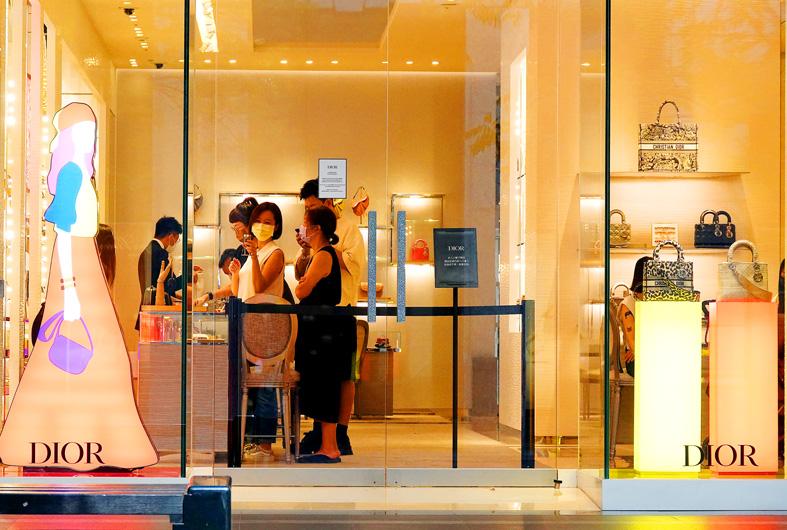The Chung-Hua Institution for Economic Research (CIER, 中華經濟研究院) yesterday revised up its forecast for Taiwan’s GDP growth this year from 4.8 percent to 5.16 percent, as exports gain speed on the back of an improving global economy, offsetting sluggish consumer activity caused by a nationwide level 3 COVID-19 alert to combat the outbreak.
The Taipei-based think tank said that external demand remains strong, despite spikes in local COVID-19 infections, and that private investment would also lend support.
“The pace of economic recovery in the US and China has proven faster than expected, boding well for Taiwanese exports,” CIER president Chang Chuang-chang (張傳章) told an online news conference in Taipei.

Photo: CNA
The two economies account for more than 50 percent of outbound shipments of electronics used in smartphones, laptops, cars, data centers and Internet of Things applications.
Exports are now projected to expand 22.58 this year, while imports are forecast to pick up 22.58 percent, the institute said.
This year’s economy would be characterized by robust exports and lackluster consumer spending, whose recovery has been derailed by the COVID-19 outbreak in May and a soft lockdown thereafter, Chang said.
Export orders, a gauge of actual exports for the next one to three months, supported the observation, as orders last month soared 31.1 percent year-on-year to US$53.73 billion, due to global technology brands building up inventory for the holiday season, the Ministry of Economic Affairs said.
Taiwan Semiconductor Manufacturing Co (TSMC, 台積電), the chip supplier of Apple’s iPhones and Macbooks, alone contributes about 5 percent to Taiwan’s GDP growth, said Tsai Yu-tai (蔡鈺泰), head of the Statistics Department at the Directorate-General of Budget, Accounting and Statistics.
TSMC’s aggressive capacity expansion has helped boost private investment, which is expected to gain 8.01 percent from last year, with support from investment to promote the use of green energy sources, Tsai said.
The government should provide targeted relief and subsidies for companies hit hard by disease prevention measures to prevent a collapse of small and medium-sized companies, CIER vice president Wang Jiann-chyuan (王健全) said.
Taiwan’s economy could exceed the 5.16 percent growth forecast — making it the best since 2010 — if the government could soon bring the outbreak under control and introduce a stimulus program to invigorate consumer spending, Chang said.
CIER expects consumer prices to gain 1.72 percent and the wholesale price index to rise 6.79 percent, facilitated by steep increases in international oil and raw material prices.
The New Taiwan dollar is forecast to trade at an average of NT$28.16 against the US dollar, it said.

With an approval rating of just two percent, Peruvian President Dina Boluarte might be the world’s most unpopular leader, according to pollsters. Protests greeted her rise to power 29 months ago, and have marked her entire term — joined by assorted scandals, investigations, controversies and a surge in gang violence. The 63-year-old is the target of a dozen probes, including for her alleged failure to declare gifts of luxury jewels and watches, a scandal inevitably dubbed “Rolexgate.” She is also under the microscope for a two-week undeclared absence for nose surgery — which she insists was medical, not cosmetic — and is

GROWING CONCERN: Some senior Trump administration officials opposed the UAE expansion over fears that another TSMC project could jeopardize its US investment Taiwan Semiconductor Manufacturing Co (TSMC, 台積電) is evaluating building an advanced production facility in the United Arab Emirates (UAE) and has discussed the possibility with officials in US President Donald Trump’s administration, people familiar with the matter said, in a potentially major bet on the Middle East that would only come to fruition with Washington’s approval. The company has had multiple meetings in the past few months with US Special Envoy to the Middle East Steve Witkoff and officials from MGX, an influential investment vehicle overseen by the UAE president’s brother, the people said. The conversations are a continuation of talks that

CAUTIOUS RECOVERY: While the manufacturing sector returned to growth amid the US-China trade truce, firms remain wary as uncertainty clouds the outlook, the CIER said The local manufacturing sector returned to expansion last month, as the official purchasing managers’ index (PMI) rose 2.1 points to 51.0, driven by a temporary easing in US-China trade tensions, the Chung-Hua Institution for Economic Research (CIER, 中華經濟研究院) said yesterday. The PMI gauges the health of the manufacturing industry, with readings above 50 indicating expansion and those below 50 signaling contraction. “Firms are not as pessimistic as they were in April, but they remain far from optimistic,” CIER president Lien Hsien-ming (連賢明) said at a news conference. The full impact of US tariff decisions is unlikely to become clear until later this month

Nintendo Co hopes to match the runaway success of the Switch when its leveled-up new console hits shelves on Thursday, with strong early sales expected despite the gadget’s high price. Featuring a bigger screen and more processing power, the Switch 2 is an upgrade to its predecessor, which has sold 152 million units since launching in 2017 — making it the third-best-selling video game console of all time. However, despite buzz among fans and robust demand for pre-orders, headwinds for Nintendo include uncertainty over US trade tariffs and whether enough people are willing to shell out. The Switch 2 “is priced relatively high”